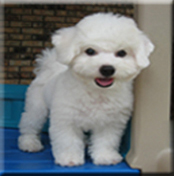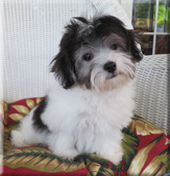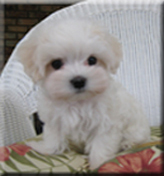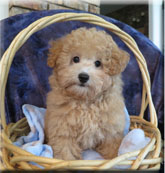
Toy Puppies Presents: 'Puppy-Dog Tales'
Teacup Dogs (1 ½ lbs. of Trouble)
Hi Everyone,
Many people call me and say they want the tinniest possible dog. The first question I ask is why. I have to chuckle at some of the answers I get. I continue to interview these people and try to ascertain if such a small dog is really what they want or only what they think they want. Most people have no idea what is involved in taking care of such a tiny dog. The puppies we are referring to are usually the smallest of a normal litter. The breeds are Yorkies, Maltese, Poodles, or Chihuahuas. The adult size of these dogs is usually under 4 lbs. full grown.
Most tiny puppies even need special attention while they are with their mother. A good breeder knows the very special care required and is willing to put out extra effort to care for the smallest of the litter. There are supplemental feedings, concern about keeping the baby warm enough and making sure it eliminates properly and is kept clean. Sometimes the mother dog, busy with her stronger puppies, will ignore the weakest. In nature or in the hands of an inexperienced breeder these puppies would never survive. The problem begins when a prospective owner insists he or she knows exactly how to take care of the puppy. Usually they don't have a clue, and as a result the puppy usually ends up at the emergency clinic within the first few days.
Teacup puppies are like premature babies. They take longer than a normal puppy of the same breed to develop and become self-sufficient. For a few people who have strong nurturing instincts, are home a lot and will follow specific instructions, the experience of raising one of these tinies is at best stressful, but do-able. For most people, however it is a disaster. What ends them up in the hospital is not a sickness, it's inadequate care.
Tiny dogs require very special round the clock attention. You MUST have a crate. A crate is an open wire cage, NOT the plastic carry case with the screen on the door. The baby needs to be confined to rest and eat. Like a human baby spends most of its time in the crib, a tiny puppy should spend a lot of time in its cage. Next is body temperature. Dogs under 2 lbs. can not properly maintain the correct temperature and frequently get chilled, especially if they haven't eaten enough. Feel the ears. If the ears are warm you are OK, but if the ears are cold the puppy is cold. If you are not sure put your finger into the puppies mouth, it should be very warm, almost hot. If it isn't, rush to the vet; it's an emergency. Get a heating pad, put it on low and cover it with a towel (not too thick) feel it with your inner arm not your hand make sure it is warm not hot. Allow room in the crate for the puppy to move off the heat pad if it gets too warm.
The most important thing is eating. The baby must eat at least a tablespoon of food every four hours. Many toy dogs are not good eaters at first. You must try anything. Take puppy food soak it with hot water to soften it, mix in some canned Mighty Dog, or Pedigree for toy dogs, and see if he will eat that. He may eat that once or twice and than not want it the next meal. Cook or buy a roasted chicken cut up into small pieces white or dark meat, offer it warm in a shallow dish. Try hamburger cooked with its natural juices by itself or crumble the meat and mix with soaked Iams Puppy food. The bottom line is the puppy must eat. Offer anything that may get him to eat. If all efforts fail ask your veterinarian about the special puppy diet available from your vet. It's in a can called PD. Offer this diet right from the can or mixed with the soaked kibble. The doctor can teach you how to feed the baby with a syringe right into his mouth. You may have to do that to supplement him for a week or so until he eats on his own. As soon as he is eating regularly you can ease him back onto dog food.
For the greatest majority of people a "Teacup" puppy is a really bad idea. It is definitely not good around children. It can easily get stepped on or dropped. However, if you have your mind made up that's what you want, here are a few suggestions before you buy one. Buy the puppy from a reputable breeder. A place that has all kinds of dogs in cages is not a breeder no matter what they claim. If they are breeders ask to see the parents. Some stores and small kennels claim to get their puppies from private breeders. This statement is false. Only "Puppy Mills" sell their dogs to stores. Quality breeders sell their puppies directly to the customer. They are concerned as to where the puppies are going and what kind of home they will have.
When you go to select a pup, pay close attention to the environment it's raised in. It should be clean and pleasant. All the adult dogs should be well cared for, healthy, clean and very friendly. The puppy should be bright eyed and active when you see it. Ask the breeder to feed the puppy in front of you so you can see it eat. Seek out an older puppy if possible 3 ½ to 5 months. With an older puppy it is easier to project adult size. You also want to rule out health problems that could cause the puppy not to grow properly: hence the dog is small because there is something wrong with it. After you purchase a pup spend a few dollars at the vet and have him check for a liver shunt and heart or thyroid problems. It is better to know if there is a problem immediately than after you get attached to your new baby.
Be open to good advice from your breeder as to which breed or which puppy would be the best choice for your home. After a selection is made your breeder should offer assistance and backup to you in the area of care, feeding and training.
Good luck to all of you, and remember you are always better off with a 5 pound dog than a 3 pound dog.Until next time, remember:
Try to be as wonderful as your dog thinks you are.
Warmest Regards,
Myra















